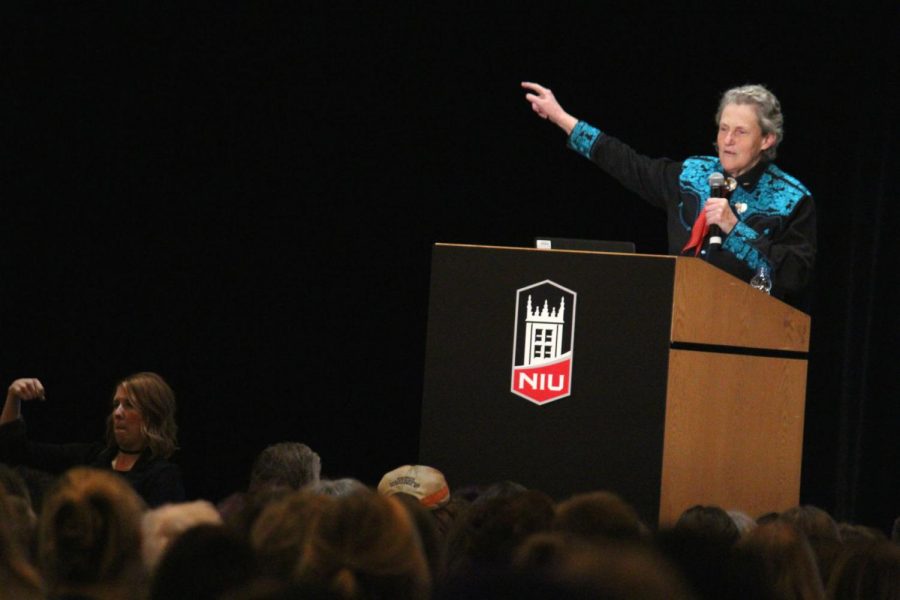Autism: moving beyond labels
Autism spokesperson Temple Grandin talks about her personal experience with autism during her event, Developing Individuals Who Have Different Kinds of Minds. Grandin spoke Wednesday in the Duke Ellington Ballroom.
December 7, 2017
DeKALB — Famed autism spokesperson Temple Grandin spoke about the relevance of different minds in society and the different ways individuals think and learn on campus Wednesday.
As someone with autism herself, Grandin focused the presentation on the autistic brain during the event in the Duke Ellington Ballroom. There was not an empty seat in the house. Grandin, who has studied psychology and animal science, has published 18 books on the topics of autism and humane animal treatment.
Grandin shared information based on her own experiences and research to explain the ways different minds work.
“I got motivated when studying; [it] became the way to a goal of becoming a scientist,” Grandin said. “Education needs to be the way to a goal.”
Autism is a disorder which can be the cause of many symptoms, including challenges with social skills and speech, while the spectrum refers to the varying combinations of strengths and weaknesses, according to AutismSpeaks.org.
Members of the audience were moved by Grandin’s presentation, which drew many individuals from out of town to attend. Among those was AID rehab specialist Nana Zanieg, who said much of what Grandin spoke to aligned with her own beliefs. AID is an organization that works with individuals who have developmental, intellectual, physical, or mental health challenges.
“I loved her, I don’t know if anything changed because I’ve been in that view to begin with, so it’s just a nice reassuring fact that ‘hey, this is a good thing,’” Zaneig said.
Grandin suggested a new approach to the spectrum, which she believes could better represent the autistic community rather than giving individuals generalized labels.
“I don’t want to see a label holding back your career; that’s something I don’t want to see,” Grandin said.
Furthering her discussion of different minds, Grandin introduced four types of thinking used by those with autism: photo-realistic visual thinking, pattern thinking, verbal logic thinking and auditory thinking. Grandin explained how each thinking type has its respective strengths and weaknesses.
Individuals with autism who are photo-realistic visual thinkers tend to do poorly with math, while pattern thinkers tend to do poorly with reading. The verbal logic thinker typically struggles with drawing, while the auditory thinker tends to struggle with visual perception.
Grandin identifies herself to be a photo-realistic visual thinker who struggles very much with understanding algebra.
“I’m worried that our visual thinkers are getting screened out by some of the strict algebra classes,” Grandin said. “I think it’s just ridiculous. Let them take geometry; I’m not suggesting no math — I’m not suggesting that — but I think there’s some pattern thinkers that think you could have algebra in order to think. It didn’t make any sense to me; there are no pictures.”
Grandin identified what she believes to be many issues with the educational system. One of these was the top-down, verbal culture that doesn’t cater to some visual thinkers and individuals with autism or dyslexia, who she said are often “bottom-up” thinkers.
Grandin said bottom-up thinkers learn concepts on the basis of specific examples, which requires a high volume of data.
“This is the way my mind is: people have said to me my talks are better at 50 than they were at age 40,” Grandin said. “That’s why you’ve got the kids; get them out doing things.”
Grandin used these examples to further her point about the importance of hands-on work.
The audience was widely comprised of educators or parents of children with autism. In terms of working with diagnosed children, Grandin emphasized the importance of hands-on work, which allows them to develop work ethic.
Grandin said one of the worst things schools have done is take away hands-on courses like culinary and woodshop.
AID Employment Specialist Carol Kicher was moved by Grandin’s response to a mother questioning when it would be appropriate to tell her five-year-old son he is autistic.
Grandin made very clear how beneficial it is for individuals with autism to participate in hands-on activities so they can better develop a sense of receiving a task and completing it.
“We need to get lots of hands-on learning experiences, work experiences, and don’t allow yourself to become your label,” Grandin said.














